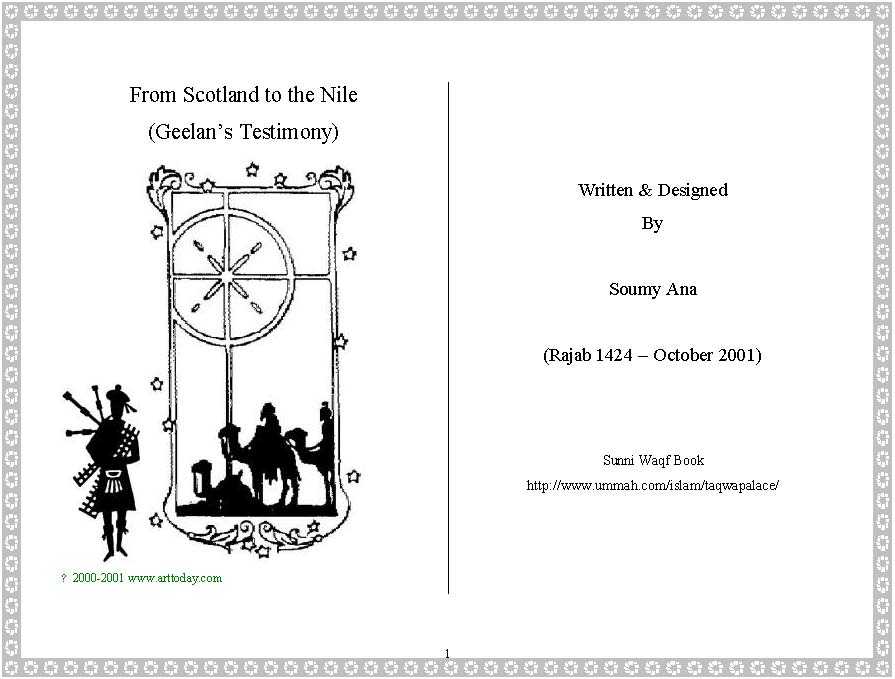(Geelan’s Testimony)
Written & Designed
By
Soumy Ana
(Rajab 1424 – October 2001)
Sunni Waqf Book http://www.ummah.com/islam/taqwapalace/
? 2000-2001 www.arttoday.com
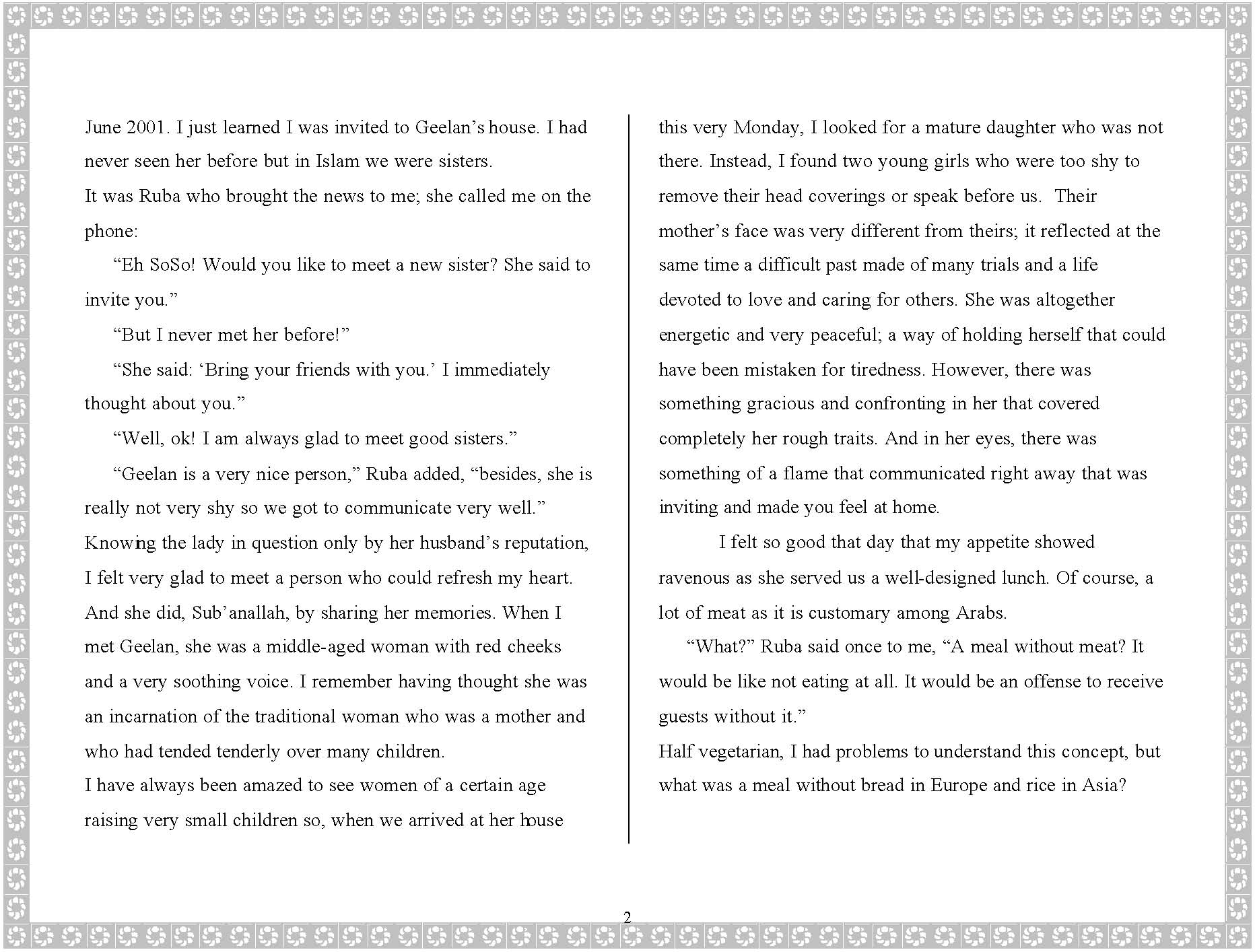
June 2001. I just learned I was invited to Geelan’s house. I had never seen her before but in Islam we were sisters. It was Ruba who brought the news to me; she called me on the phone:
“Eh SoSo! Would you like to meet a new sister? She said to invite you.”
“But I never met her before!”
“She said: ‘Bring your friends with you.’ I immediately thought about you.”
“Well, ok! I am always glad to meet good sisters.”
“Geelan is a very nice person,” Ruba added, “besides, she is really not very shy so we got to communicate very well.” Knowing the lady in question only by her husband’s reputation, I felt very glad to meet a person who could refresh my heart. And she did, Sub’anallah, by sharing her memories. When I met Geelan, she was a middle-aged woman with red cheeks and a very soothing voice. I remember having thought she was an incarnation of the traditional woman who was a mother and who had tended tenderly over many children. I have always been amazed to see women of a certain age raising very small children so, when we arrived at her house this very Monday, I looked for a mature daughter who was not there. Instead, I found two young girls who were too shy to remove their head coverings or speak before us. Their mother’s face was very different from theirs; it reflected at the same time a difficult past made of many trials and a life devoted to love and caring for others. She was altogether energetic and very peaceful; a way of holding herself that could have been mistaken for tiredness. However, there was something gracious and confronting in her that covered completely her rough traits. And in her eyes, there was something of a flame that communicated right away that was inviting and made you feel at home. I felt so good that day that my appetite showed ravenous as she served us a well-designed lunch. Of course, a lot of meat as it is customary among Arabs.
“What?” Ruba said once to me, “A meal without meat? It would be like not eating at all. It would be an offense to receive guests without it.” Half vegetarian, I had problems to understand this concept, but what was a meal without bread in Europe and rice in Asia?
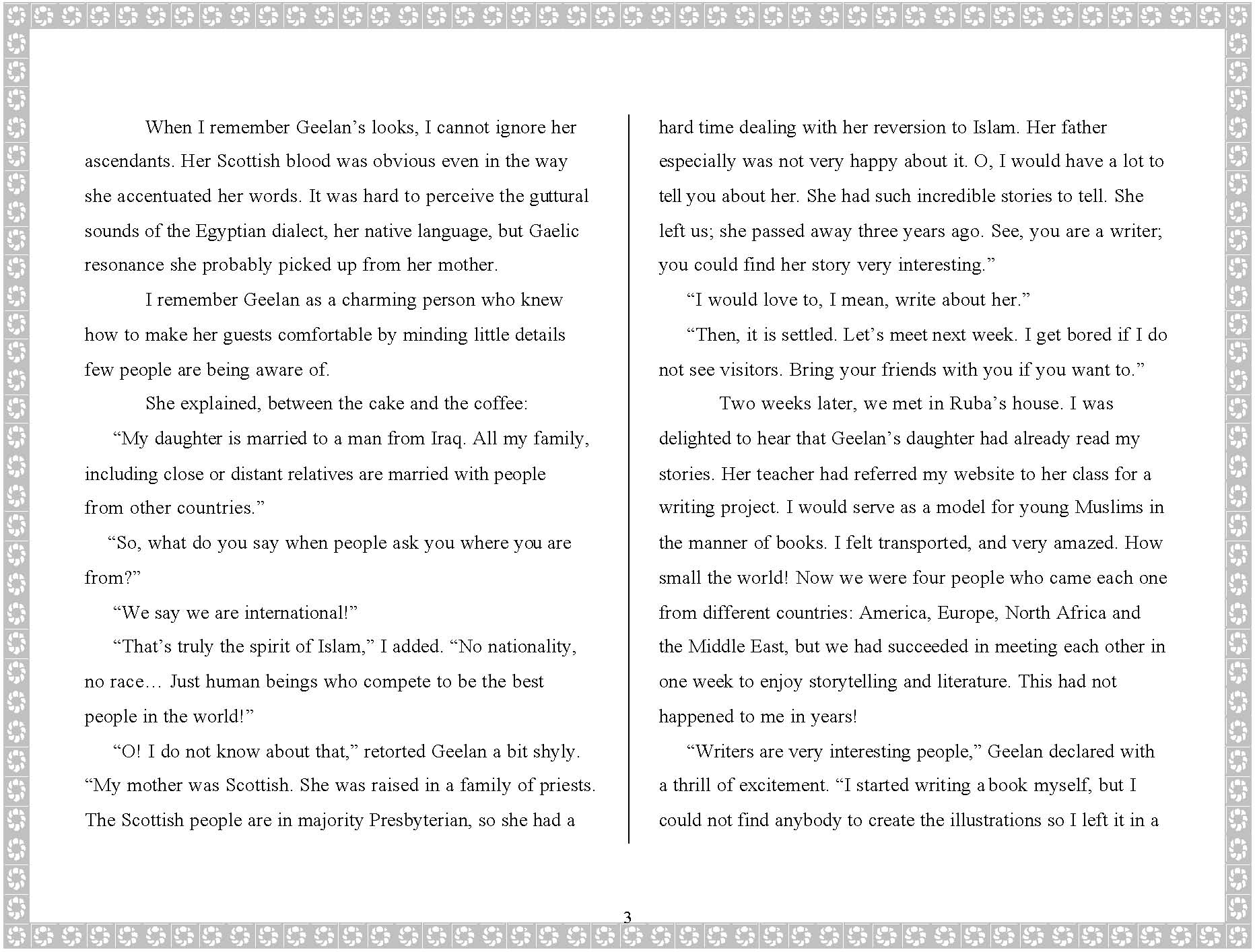
When I remember Geelan’s looks, I cannot ignore her ascendants. Her Scottish blood was obvious even in the way she accentuated her words. It was hard to perceive the guttural sounds of the Egyptian dialect, her native language, but Gaelic resonance she probably picked up from her mother. I remember Geelan as a charming person who knew how to make her guests comfortable by minding little details few people are being aware of. She explained, between the cake and the coffee:
“My daughter is married to a man from Iraq. All my family, including close or distant relatives are married with people from other countries.”
“So, what do you say when people ask you where you are from?”
“We say we are international!”
“That’s truly the spirit of Islam,” I added. “No nationality, no race… Just human beings who compete to be the best people in the world!”
“O! I do not know about that,” retorted Geelan a bit shyly. “My mother was Scottish. She was raised in a family of priests. The Scottish people are in majority Presbyterian, so she had a hard time dealing with her reversion to Islam. Her father especially was not very happy about it. O, I would have a lot to tell you about her. She had such incredible stories to tell. She left us; she passed away three years ago. See, you are a writer; you could find her story very interesting.”
“I would love to, I mean, write about her.”
“Then, it is settled. Let’s meet next week. I get bored if I do not see visitors. Bring your friends with you if you want to.” Two weeks later, we met in Ruba’s house. I was delighted to hear that Geelan’s daughter had already read my stories. Her teacher had referred my website to her class for a writing project. I would serve as a model for young Muslims in the manner of books. I felt transported, and very amazed. How small the world! Now we were four people who came each one from different countries: America, Europe, North Africa and the Middle East, but we had succeeded in meeting each other in one week to enjoy storytelling and literature. This had not happened to me in years!
“Writers are very interesting people,” Geelan declared with a thrill of excitement. “I started writing a book myself, but I could not find anybody to create the illustrations so I left it in a chest of drawers. My sister wrote a big book though. She wrote on The Signs of the Qiyyama (the End of the World), a very researched and sophisticated book. She finished writing it on her deathbed. We promised to publish it for her. It is our siyah. O! One of these promises in life that we cannot keep. Pray, SoSo, for us, so that we manage somehow to find her a publisher.” I almost voiced my desire to type it and publish it on the Internet, but I kept silent. Few people were ready to give away a work that had asked a lot of research and painstakingly writing.
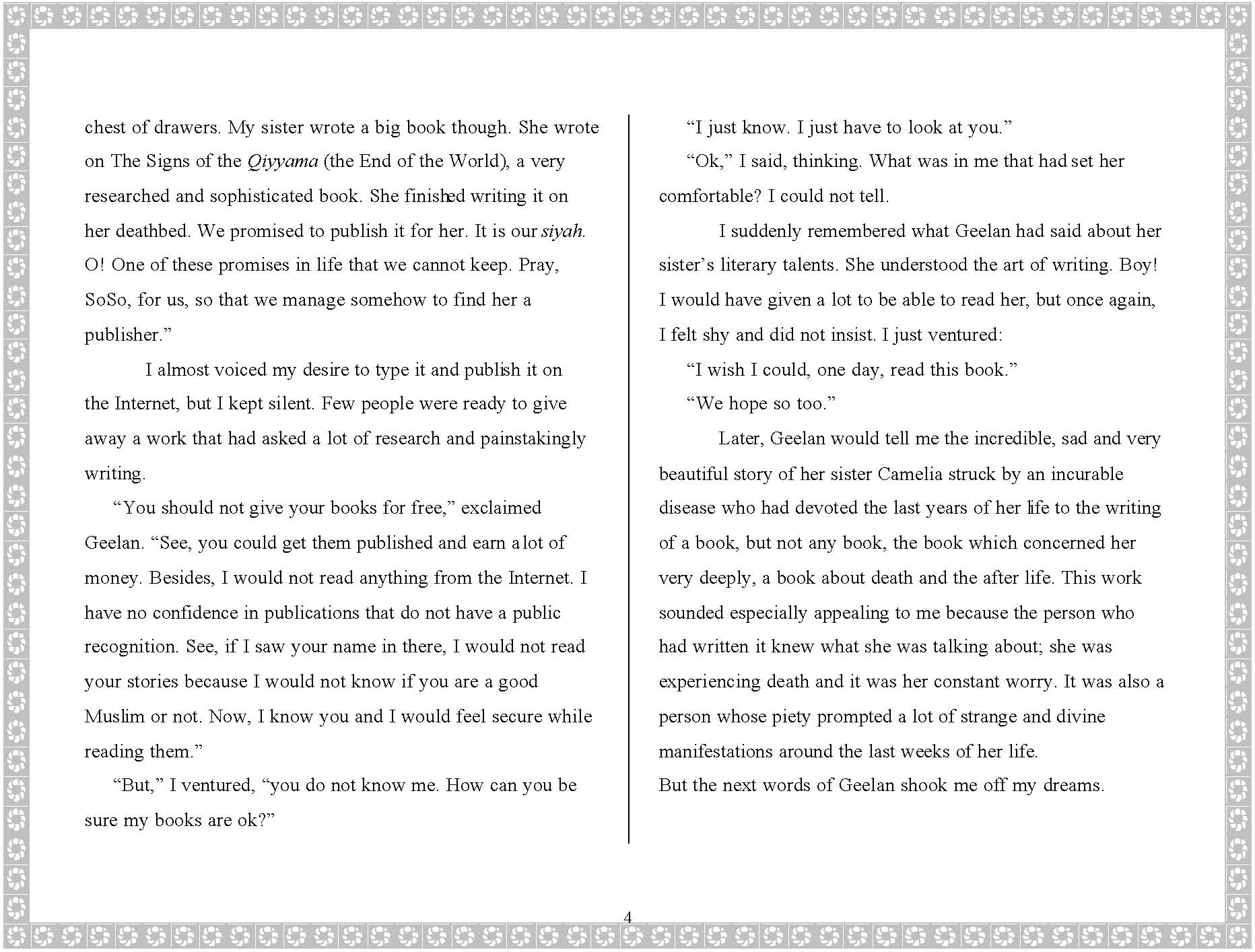
“You should not give your books for free,” exclaimed Geelan. “See, you could get them published and earn a lot of money. Besides, I would not read anything from the Internet. I have no confidence in publications that do not have a public recognition. See, if I saw your name in there, I would not read your stories because I would not know if you are a good Muslim or not. Now, I know you and I would feel secure while reading them.”
“But,” I ventured, “you do not know me. How can you be sure my books are ok?”
“I just know. I just have to look at you.”
“Ok,” I said, thinking. What was in me that had set her comfortable? I could not tell. I suddenly remembered what Geelan had said about her sister’s literary talents. She understood the art of writing. Boy! I would have given a lot to be able to read her, but once again, I felt shy and did not insist. I just ventured:
“I wish I could, one day, read this book.”
“We hope so too.” Later, Geelan would tell me the incredible, sad and very beautiful story of her sister Camelia struck by an incurable disease who had devoted the last years of her life to the writing of a book, but not any book, the book which concerned her very deeply, a book about death and the after life. This work sounded especially appealing to me because the person who had written it knew what she was talking about; she was experiencing death and it was her constant worry. It was also a person whose piety prompted a lot of strange and divine manifestations around the last weeks of her life. But the next words of Geelan shook me off my dreams.
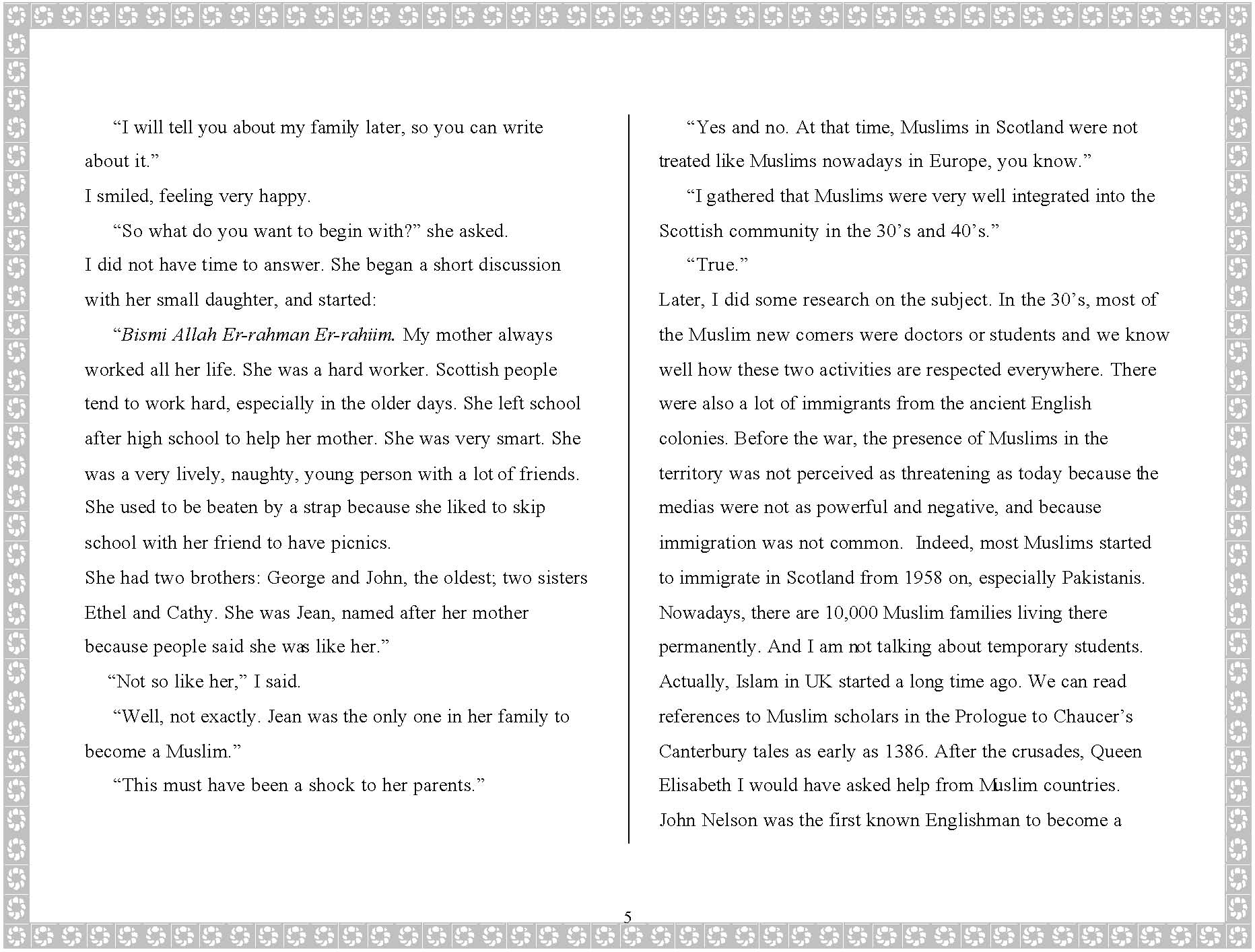
“I will tell you about my family later, so you can write about it.” I smiled, feeling very happy.
“So what do you want to begin with?” she asked. I did not have time to answer. She began a short discussion with her small daughter, and started:
“Bismi Allah Er-rahman Er-rahiim. My mother always worked all her life. She was a hard worker. Scottish people tend to work hard, especially in the older days. She left school after high school to help her mother. She was very smart. She was a very lively, naughty, young person with a lot of friends. She used to be beaten by a strap because she liked to skip school with her friend to have picnics. She had two brothers: George and John, the oldest; two sisters Ethel and Cathy. She was Jean, named after her mother because people said she was like her.”
“Not so like her,” I said.
“Well, not exactly. Jean was the only one in her family to become a Muslim.”
“This must have been a shock to her parents.”
“Yes and no. At that time, Muslims in Scotland were not treated like Muslims nowadays in Europe, you know.”
“I gathered that Muslims were very well integrated into the Scottish community in the 30’s and 40’s.”
“True.” Later, I did some research on the subject. In the 30’s, most of the Muslim new comers were doctors or students and we know well how these two activities are respected everywhere. There were also a lot of immigrants from the ancient English colonies. Before the war, the presence of Muslims in the territory was not perceived as threatening as today because the medias were not as powerful and negative, and because immigration was not common. Indeed, most Muslims started to immigrate in Scotland from 1958 on, especially Pakistanis. Nowadays, there are 10,000 Muslim families living there permanently. And I am not talking about temporary students. Actually, Islam in UK started a long time ago. We can read references to Muslim scholars in the Prologue to Chaucer’s Canterbury tales as early as 1386. After the crusades, Queen Elisabeth I would have asked help from Muslim countries. John Nelson was the first known Englishman to become a
